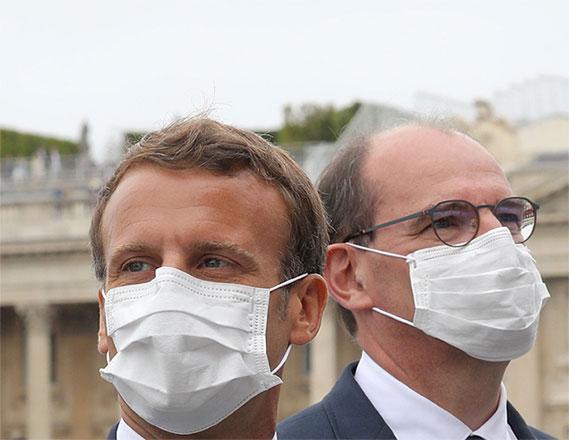- International News
- Friday-2020-12-18 | 10:10 am

French President Emmanuel Macron became the latest head of state to test positive for coronavirus on Thursday, forcing several other European leaders into quarantine as the continent struggles with a winter surge in infections.
With Europe now approaching 500,000 deaths since COVID-19 first emerged a year ago, the EU has pledged to start vaccination campaigns across the bloc by the end of the year in a bid to curb the spread of the disease.
With inoculations seen as the only way to bring the global pandemic to an end, American experts were set to discuss on Thursday if US pharma company Moderna's vaccine should be authorised — the latest to seek approval after the rollout of the Pfizer-BioNTech jab.
Macron was tested for coronavirus after he suffered the first symptoms and will now self isolate for seven days, his office said in a statement.
"He will continue to work and carry out his activities remotely."
The French leader joins US President Donald Trump and British Prime Minister Boris Johnson who were both briefly hospitalised earlier this year after contracting the virus that has killed 1.6 million people worldwide and caused economic havoc around the globe.
Macron had attended an EU summit in Brussels last week and on Monday was personally present at a Paris conference organised by the Organisation for Economic Co-operation and Development (OECD).
Spanish Prime Minister Pedro Sanchez, and president of the European Council, Charles Michel, who were in Paris for the meeting, have entered self-isolation as a precaution.
Portuguese Prime Minister Antonio Costa also went into self-isolation on Thursday, a day after a lunch meeting with Macron, his office said.
French Prime Minister Jean Castex will also self-isolate.
‘Europe’s moment’
Macron’s infection came as Europe battles to contain a new upswing in infections with several countries returning to tough lockdowns, curfews and other virus restrictions with fears of an explosion in cases after the Christmas holidays.
Germany reported record daily virus infections at 30,000 cases on Thursday.
Denmark, France, Turkey and The Netherlands have all strengthened curbs, while Germany began a new partial lockdown on Wednesday.
"It feels like a Sunday,” said Ines Kumpl, 57, observing the deserted streets of Berlin on the first day of a new partial lockdown. "These measures are necessary but it’s stressful.”
The EU is to start COVID-19 inoculations on December 27, European Commission President Ursula von der Leyen said on Thursday.
"It’s Europe’s moment. On 27, 28 and 29 December vaccination will start across the EU,” she tweeted.
Pressure has been mounting on the European Union to speed up approvals since Britain and the US started their immunisation programmes with the Pfizer-BioNTech vaccine.
US record deaths
As surges in infections prompts tighter restrictions in several European countries, the United States — the worst-hit nation in the world — set its own double record, with more than 3,700 deaths and 250,000 new cases in 24 hours on Wednesday.
With the US floundering in its efforts to control the virus, Moderna’s vaccine is seen as a potential boost in the fight against COVID-19, and approval from the experts’ panel on Thursday could potentially pave the way for a rollout early next week.
"Recent news on vaccines has been very positive. However, significant challenges and uncertainties remain with regard to the timing, production, and distribution of vaccines as well as their efficacy across different groups,” Jerome Powell, chair of the US Federal Reserve, said on Wednesday.
"The ongoing surge in new COVID-19 cases both here, in the United States, and abroad is particularly concerning. And the next few months are likely to be very challenging.”
Should the panelists vote in favour of the Moderna vaccine, as is widely expected, the Food and Drug Administration is likely to give a green light soon after, making the US the first country to approve it.
The US has already started vaccinating people with the Pfizer-BioNTech vaccine, and is hoping to have 20 million people immunised in December.
Healthcare workers and long-term care residents are at the front of the line, and efforts are under way to convince the American public that the vaccines are safe.
The White House announced Vice President Mike Pence and his wif













